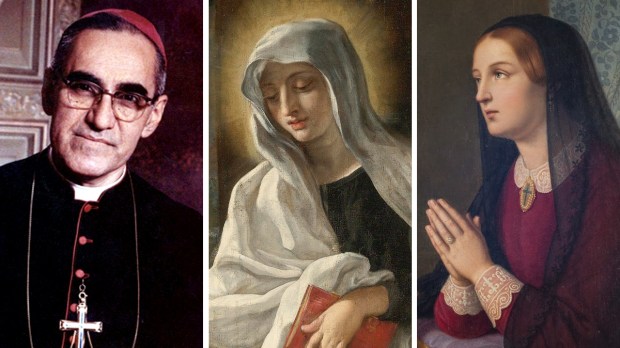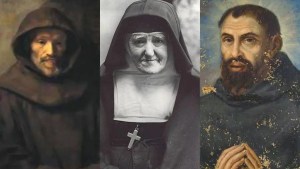Stories of saints preaching on street corners, talking hardened criminals into converting, and traveling the world to speak the name of Jesus can leave the shy among us assuming that holiness must require an outgoing personality. Garrulous people, on the other hand, may read stories of astonishing meekness and patience and find themselves convinced that only the placid can be canonized. The devil often convinces us that whatever our personality, we can’t possibly be holy. But there is no personality type that’s more inclined to sanctity than any other. If your shyness has ever made you feel small beside such outgoing saints as Philip Neri and Francis Xavier, take comfort from the stories of these saints, for whom holiness meant living with diffidence, reserve, and even bashfulness—and finding that God made them that way on purpose.
St. Frances of Rome (1384-1440) was a noble Italian wife and mother who had longed for religious life as a young woman—if only to avoid the constant socializing expected of a noblewoman. Frances was so introverted that her social duties once led to a nervous breakdown. It was only after accepting her lot in life that she was healed. Sent back out to the world of balls and social calls, Frances might have been overwhelmed yet again, but she discovered that her sister-in-law Vanozza also longed for silence and prayer. The two began to work together, helping each other in their daily tasks so that each could retreat into silence more often, making a little monastery of their mansion. Her daily time in silence fueled her for life in high society, where she was then able to thrive.
Bl. Maria Cristina of Savoy (1812-1836) was princess of Sardinia and ultimately queen of Naples, though she would have preferred to enter religious life. Maria Cristina was quite beautiful, but she was so shy as to be deeply uncomfortable at court. Still, she was beloved by her people, who were grateful for her great acts of charity and for the influence she had on a king who was not known for being overly concerned about the poor. Maria Cristina died from complications after childbirth only four years after her marriage.
St. Magdalena Son So-byok (1800-1840) lost her parents when she was young and was raised by her grandmother, leaving her quite shy and cautious around new people. Because of this, Magdalena didn’t encounter any Christians as a child (though her parents had been Christians). She ultimately came to know Jesus and was married to St. Peter Choe Chang-hub. A soft-spoken housewife with a talent for sewing and embroidery, Magdalena soon became a mother. But though her oldest daughter was healthy, her next nine children all died in infancy. Magdalena persevered in the midst of all this suffering and was ultimately martyred, along with her husband, her daughter, and her son-in-law.
Bl. Dina Bélanger (1897-1929) was a Canadian concert pianist, composer, and mystic who studied at a conservatory in New York City before becoming a Sister and a music teacher. But though she wowed audiences with her talent, Dina had no particular interest in accolades. She much preferred to be alone, though she enjoyed the company of one or two close friends. It was with no great regret that she left behind her glamorous life to become a Sister. Through all this, Dina was also receiving mystical visions, which she experienced until the end of her life at only 32.
Bl. Mario Borzaga (1932-1960) was an Italian missionary priest working in Laos. Hampered by his inability to speak the local language, Fr. Mario continued to work with local catechists preaching. But his difficulty with Laotian wasn’t simply an intellectual matter—he was too shy to try, writing, “My cross is my shyness which keeps me from pronouncing a single word in Laotian.” In this frustration, he found himself united to the Cross of Jesus, his struggle with timidity thus becoming an opportunity for grace. Fr. Mario continued to serve the people of Laos until he was martyred by communist insurgents alongside Bl. Paul Thoj Xyooj.
St. Oscar Romero (1917-1980) was a Salvadoran bishop who was almost painfully shy and bookish. He also had OCD, which may have exacerbated his social struggles. It was this seemingly weak personality that recommended him to the abusive government at the time; they requested that the timid priest be made their archbishop, certain that he wouldn’t make any trouble for them. They were right—until Romero prayed before the corpse of his friend Ven. Rutilio Grande, at which point he determined that he could no longer look away form the government’s abuses. Though he had avoided the spotlight (and most confrontation) for 60 years, Archbishop Romero was transformed. He continued to be a soft-spoken man, but he was now courageous and even prophetic. He was ultimately killed while celebrating Mass.
St. Dulce Pontes (1914-1992) was a Brazilian nun who was nominated for a Nobel Prize for her work with the poor. Though she was a force to be reckoned with, fighting for the rights of the oppressed even when it meant facing down the wealthy and powerful, Sr. Dulce was actually quite shy. And though she could often be seen carrying the sick on her back, Sr. Dulce suffered from a medical condition that left her lungs functioning at only 30% capacity. But she didn’t allow either her natural reticence or her disability to stop her from her work, which ultimately changed the face of social services throughout Brazil.


